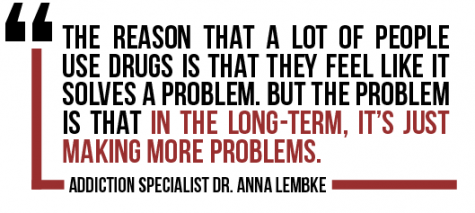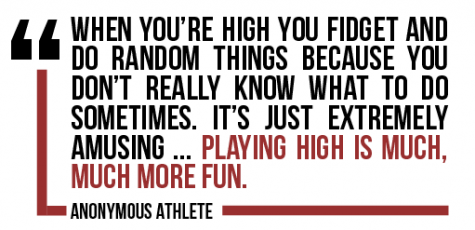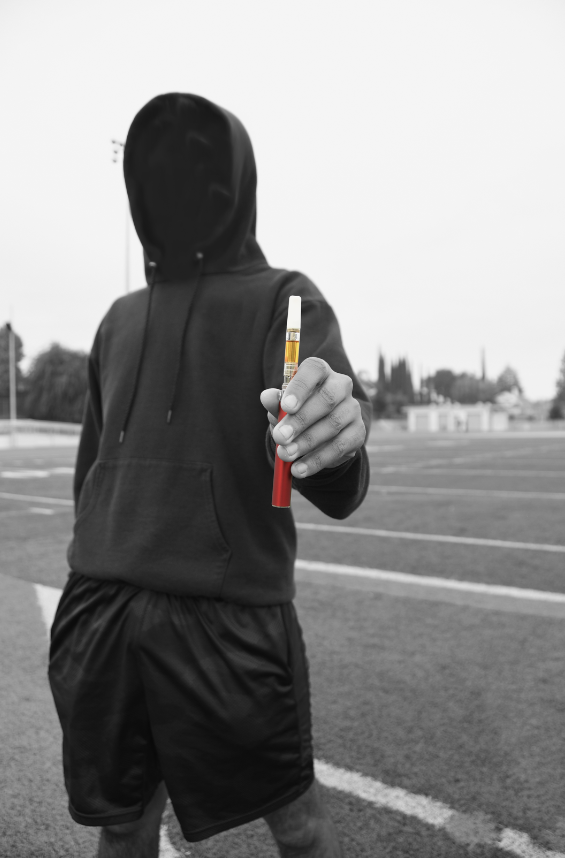High times: How marijuana influences sports
December 18, 2018
He was playing shockingly well. It was surprising to him because he had just smoked marijuana, forgetting that he had practice later in the day. He had made the decision to attend practice anyway, and he dominated every time he got the ball. After practice had finished, he reflected on his performance, concluding that it had been amazing. Or so he thought.
“I thought I was [a professional player], and then apparently after practice, [a teammate] tells me that coach went up to him and [said] ‘Why is [he] not running?’ So apparently, I was sitting in the same spot and just looking around and passing the ball whenever it came to me. So apparently I was not playing great even though I perceived it as amazing,” he said. “You feel [like you’re playing better] in the moment but afterwards you realize that you actually didn’t play as well as you could have.”
According to this anonymous athlete, who will be referred to as Logan in order to protect his identity, this false perception of one’s performance is an effect of marijuana. The substance has a significant presence in sports, as players may use it for reasons ranging from healing wounds to relieving pressure. According to the FUHSD Code of Conduct, “use of illegal substances including tobacco, alcohol and drugs” will result in a “loss of eligibility” for participation in sports. Despite this, according to a survey of 34 MVHS students who say they’ve smoked marijuana before, 19 students admit they performed physical activity such as exercising or playing a sport while high.
For another anonymous athlete, who will be referred as Shane, marijuana is particularly helpful for pain relief or recovery after participating in physically taxing sports.
“After sophomore year I realized that [weed] really helps in terms of contact sports,” Shane said. “I have to go all out so I get kind of hurt after practice and after games. Using marijuana or something with THC is super relieving.”
However, another anonymous athlete, who will be referred to as Gary, explains that marijuana allowed him more control over his ability when he smoked before certain practices or games last year. According to Gary, he was able to play better because he felt more collected.
“I felt like I didn’t get tired as easily … you just feel more calm,” Gary said. “Especially when you’re in difficult one-on-one situations with the [opposing team] or if [I] get a little nervous and panicky, it just really calmed me down so I could play more calm and composed.”
Dr. Anna Lembke, a Stanford doctor who specializes in addiction disorders, explains that this calming effect is commonly associated with marijuana use. However, she emphasizes that becoming dependent on marijuana can be very detrimental.
“It’s certainly true that for many people, in the short term, weed can help reduce anxiety,” Lembke said. “All drugs in the immediate short term make people feel better — the problem is for long term cumulative effects or the effects after the drugs wear off when people have their ‘come-down.’”
Gary says that there are some benefits of smoking — like feeling more calm — but he doesn’t rely on marijuana to perform well. To him, the sport is too important to risk losing his opportunity to play because of drugs.
“[This sport] has been a part of my life since I was two. It’s just the most profound thing in my life by far —nothing can even compare to it,” Gary said. “I don’t want to jeopardize it with something that could potentially hurt me in the long run while I’m playing, who knows — something bad could happen while I’m playing.”
Gary also attributed this fear of using weed to stories he has heard from some of his peers about their negative experiences with the drug. Lembke explains that there is evidence that marijuana affects cognition, motivation and could cause more fatigue. As a result, Gary is very cautious about when he gets high.
“I’ve heard stories of people who pass out while playing due to exhaustion, like especially on marijuana,” Gary said. “Definitely if there was a very serious practice or very serious game I would not even dream doing it, even [on] the day of the game or the practice.”
Similar to Gary, Shane has also experimented with weed and felt its effects on his game play. He finds that sometimes weed can have a negative effect on his physical abilities.
“Sometimes if I’m super high, I can be super focused because of the adrenaline rush,” Shane said. “However, I’ve never played a game high but I’ve gone to a couple practices high. One time it was okay and one time it wasn’t a good [experience].”
Shane feels that one’s decision to use marijuana while playing depends on the nature of the sport or the position the player has on the team. He explains that some sports require attentive focus on the opponent, which can be hard to do while under the influence. However, he feels that if the person has a position on a team that is as not significant, being under the influence is okay.
While some teenage athletes acknowledge the benefits of marijuana, it is still banned from many professional sports leagues. Despite this, Shane believes NFL players specifically should be allowed to use weed because of its help in relieving stress.
“A lot of NFL athletes play games high because [they are] playing in a crowd that big and their well-being [is] on the line,” Shane said. “Your well-being, income, family all [depend] on how well you play on the field, if you mess up it’s all gone. That’s a lot of pressure, so a lot of them smoke weed just to help with the pressure.”
Although some professional players may choose to use marijuana, Lembke warns of the heightened risk of addiction for teenagers like Gary, Shane or Logan. She says that starting to use weed as a teenager increases the chance of becoming addicted into adulthood, because the brain wires itself to become dependent on weed for dopamine release. She encourages teens to seek help, as well as finding other coping strategies aside from marijuana.
“The reason that a lot of people use drugs is that they feel like it solves a problem, and in the short-term it is solving a problem for them,” Lembke said. “But the problem is that in the long-term, it’s just making more problems.”

At the end of the day, Gary and Logan both say their motivations for smoking are purely for enjoyment. They both agree that playing can be made more exciting by using marijuana.
“Sometimes I don’t care enough to put my full effort into a game, so that’s why I play high,” Logan said. “I [get to] enjoy playing [the game] rather than getting pissed at the team, which would happen otherwise.”
Gary adds that he enjoys playing recreational sports high — with his friends, it’s one of the most enjoyable activities to do after smoking. For him, it also comes down to pleasure and satisfaction.
“I don’t know, it’s just something about having [a] ball, like when you’re high you fidget and just do random things because you don’t really know what to do sometimes, so just having a ball … it’s just extremely amusing,” Gary said. “[Playing high is] much, much more fun.”






























